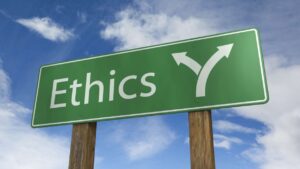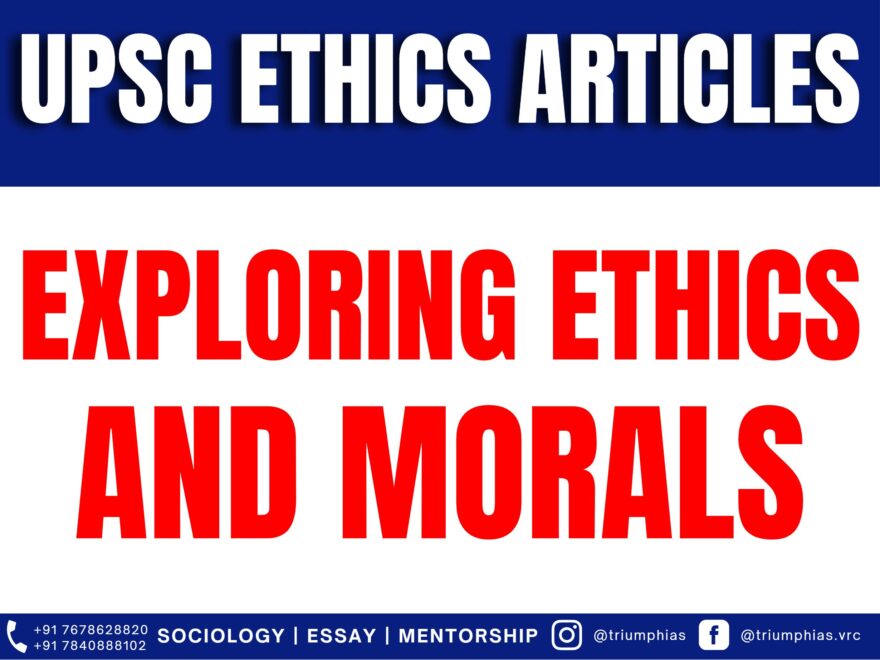Ethics: What is it and what is it not?
(Relevant for Ethics, Integrity and Aptitude)

Ethics and morals pertain to the distinction between “right” and “wrong” behavior. While these terms are sometimes used interchangeably, they have distinct meanings: ethics refer to the guidelines established by an external entity, such as codes of conduct in workplaces or principles in religions. On the other hand, morals reflect an individual’s own principles concerning what is right and wrong.
The origin of principles differs for ethics and morals. Ethics are derived from external standards set by institutions, groups, or culture to which an individual belongs. For instance, lawyers, policemen, and doctors are all bound by an ethical code dictated by their respective professions, irrespective of their personal sentiments or preferences. Ethics can be seen as a social system or framework that defines acceptable behavior.
Morals, too, can be influenced by culture or society, but they are personal principles developed and upheld by individuals themselves. Each person establishes their own moral code based on their beliefs and values.
Consistency and Flexibility

Ethics exhibit a high level of consistency within a specific context, yet they can significantly differ when compared across different contexts. To illustrate, the ethical principles upheld by the medical profession in the 21st century tend to remain consistent across various hospitals, but they can diverge from the ethics observed within the legal profession of the same era.
In contrast, an individual’s moral code tends to be unwavering and consistent regardless of the context in which they find themselves.
Conflicts between Ethics and Morals

- One professional example of ethics conflicting with morals is the work of a defense attorney. A lawyer’s morals may tell her that murder is reprehensible and that murderers should be punished, but her ethics as a professional lawyer require her to provide the best possible defense for her client, even if she knows the client is guilty. I have used numerous examples from the field of law and advocacy due to my practical exposure to them.
- In this context, I recall what Mahatma Gandhi stated in his autobiography, ‘My Experiments with Truth.’ As a trained barrister, he refrained from taking on false cases where he had to defend the guilty. There was an instance where he defended a culprit, but upon discovering the truth, he aligned himself with the prosecution in front of the presiding officer.
- I have read ‘My Experiments with Truth‘ thrice, and as I write this, I am also reading it to maintain my motivation regarding ethical consistency. I highly recommend reading this book to understand the deeper meaning of ‘Satyamev Jayate.’
- Another example can be found in the medical field. In most parts of the world, a doctor is prohibited from euthanizing a patient, even if it is the patient’s request, in accordance with ethical standards for healthcare professionals. However, the same doctor may personally believe in a patient’s right to choose death based on their own moral values.
- I have read ‘My Experiments with Truth’ thrice, and as I write this, I am also reading it to maintain my motivation regarding ethical consistency. I highly recommend reading this book to understand the deeper meaning of ‘Satyamev Jayate.’
- Another example can be found in the medical field. In most parts of the world, a doctor is prohibited from euthanizing a patient, even if it is the patient’s request, in accordance with ethical standards for healthcare professionals. However, the same doctor may personally believe in a patient’s right to choose death based on their own moral values.
To master these intricacies and fare well in the Sociology Optional Syllabus, aspiring sociologists might benefit from guidance by the Best Sociology Optional Teacher and participation in the Best Sociology Optional Coaching. These avenues provide comprehensive assistance, ensuring a solid understanding of sociology’s diverse methodologies and techniques.
Ethics, Morals, Best Sociology Optional Teacher, Best Sociology Optional Coaching, Sociology Optional Syllabus

